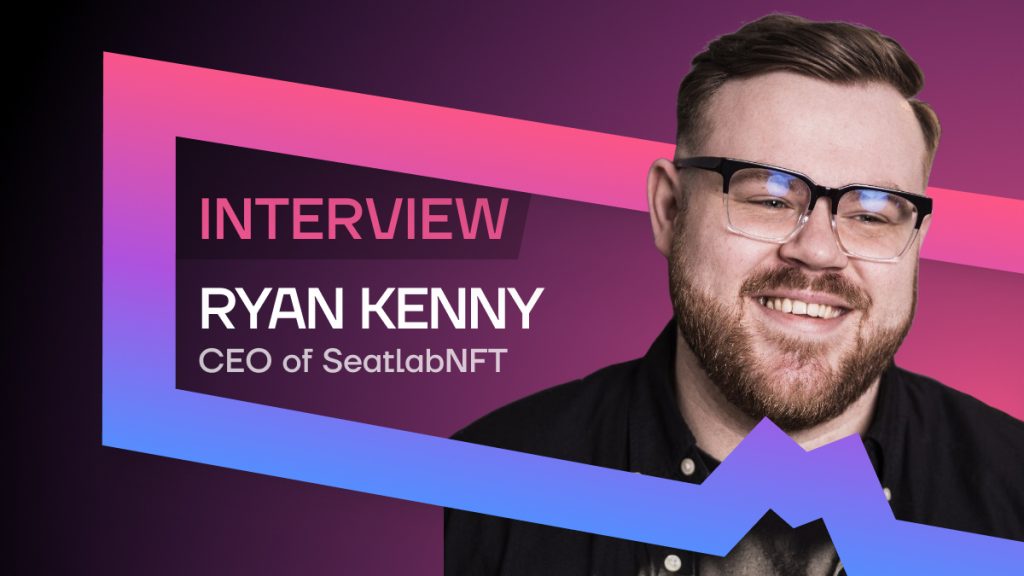SeatlabNFT CEO Ryan Kenny Discusses How NFTs are Disrupting the Ticketing Industry



For several years, ticketing fraud has been a persistent problem for the event industry. Scalpers use bots to snatch up tickets, leaving fans dry and incessantly driving up prices. Additionally, counterfeit tickets are often sold outside the venue, leading to further frustration for fans and potential security concerns for event organizers. However, with the rise of NFTs, a new and innovative solution has emerged to counteract these problems.
NFT ticketing solutions are popping up to provide a secure and transparent system for buying and selling event tickets. Tickets backed by NFT technology provide on-chain proof of ownership and authenticity, meaning fans can be confident that the tickets they purchase are legitimate and that scalpers are unable to exploit the system to drive up prices.
SeatlabNFT is one such company that has recognized the potential of NFTs in solving the problems plaguing the ticketing industry. By creating a decentralized platform that utilizes NFTs to represent tickets, SeatlabNFT aims to provide a more transparent and efficient system for event organizers and attendees alike. With NFTs, organizers can easily track the transfer of tickets and ensure that they are sold at fair prices.
In this interview with SeatlabNFT CEO Ryan Kenny, he discusses how NFTs are disrupting the ticketing industry, the benefits of using NFTs for event organizers and attendees, and the challenges that the company has faced in developing the platform.
What piqued your interest in the NFT space, and where did you first hear about it?
In 2012, I became heavily involved in the crypto space and now have a great deal of experience with all aspects of the industry, from trading to mining and now NFTs and web3.
Can you explain how Seatlab’s use of NFTs is helping to address the problem of ticket scalping and counterfeit tickets in the industry?
One of the biggest problems with traditional ticketing systems is that tickets can easily be counterfeited or duplicated, which can lead to fraudulent sales and ticket scalping. This is where NFTs come in. NFTs are unique digital assets that are stored on a blockchain, making them tamper-proof and impossible to duplicate or counterfeit. This means that once a ticket is issued as an NFT on SeatlabNFT, it can be traced back to its original owner and verified as authentic.
SeatlabNFT’s use of NFTs also helps to prevent ticket scalping by setting rules for the transfer and resale of tickets. For example, an NFT ticket on SeatlabNFT can be set up to only allow transfers between verified users or to limit the resale price to a set amount. These rules help to ensure that tickets are sold at fair prices and that they end up in the hands of true fans rather than ticket scalpers.
One of the unique features of SeatlabNFT is that it allows for royalty splits between event organizers, artists, and other stakeholders involved in an event. When an NFT ticket is resold on the secondary market, a portion of the sale proceeds can be automatically distributed to the various parties involved based on pre-set rules and agreements.
These royalty splits are determined and programmed into the NFT ticket smart contract, which is stored on the blockchain and executed automatically when the ticket is resold.
What sets Seatlab NFT apart from other NFT ticketing platforms?
In addition to providing a secure and transparent platform for buying and selling tickets, SeatlabNFT can also enhance the overall event experience by offering NFT collectables. These collectables can take many forms, such as digital art, music, or other exclusive content related to the event.
For example, an artist performing at a concert could create a limited edition NFT collectable that includes a digital version of a poster or an exclusive song that is only available to fans who attend the show. These NFT collectables can be sold separately from the event ticket or included as a bonus for attendees.
By offering NFT collectables, SeatlabNFT can provide fans with a unique and personalized experience that goes beyond just attending the event. Fans can collect and trade these exclusive digital assets, creating a sense of community and engagement around the event.
Furthermore, NFT collectables can help event organizers and artists to generate additional revenue streams. By offering limited edition NFTs with exclusive content, they can tap into the growing market for digital collectables and create a new source of income.
How does Seatlab address concerns around the potential for NFT ticketing to exacerbate inequalities in access to events, particularly for lower-income individuals?
We use the NEAR Protocol blockchain, which has minimal insignificant fees, and we also cover any gas fees incurred to the cost of purchasing tickets is no different to the end user as it would be using a traditional ticketing platform.
How does Seatlab NFT balance the benefits of NFT ticketing, such as increased security and transparency, with potential challenges around accessibility and ease of use for less tech-savvy users or non-web3 natives?
We handle all blockchain complexities in the background. When a user creates an account, we automatically create a NEAR wallet address for them based on their username. Purchasing NFT tickets and collectables can be done with a credit/debit card in the same way any other online purchase would be. The experience for the end user is very similar to using a traditional ticketing provider, but they get all of the additional benefits that NFT ticketing offer.
So, in short, we minimize any friction of using NFT ticketing for the end user, if they can attend an event ticketed via a traditional provider, they can attend an event ticketed via SeatlabNFT.
What do you think needs to be done for NFT ticketing to reach mass adoption and be the default ticket-selling method?
Be as frictionless as possible and hide the complexities of blockchain tech in the background.
Please tell us about any partnerships or collaborations that Seatlab NFT has established with event organizers or ticket brokers to promote the use of NFTs and combat ticket scalping.
We’ve worked with the likes of Lost Village, elrow Dubai, SNAFU events, Everything in Sport, and International Fitness Summit, among many others, to ticket their events and provide their attendees with a new, enhanced NFT-enabled event-attending experience.
How do you see the use of NFTs in ticketing evolving over the next few years, and how is Seatlab NFT positioning itself to stay at the forefront of these changes?
NFT ticketing has the potential to disrupt the entire industry. Not only thanks to its anti-scalping aspects but also its ability to provide attendees with an enhanced experience through collectables and airdrops. We have successfully implemented a system where attendees can be rewarded with collectable NFTs that unlock exclusive on-site experiences and rewards such as free merchandise, VIP access, and much more. These rewards are fully traceable and can be given to the most loyal fans thanks to the traceability of blockchain technology.
What metrics does Seatlab NFT use to measure success, and how do you ensure that the platform is meeting the needs of its users?
App downloads, NFT tickets issues, collectables claimed, feedback scores (from both sellers and buyers).
What do you think about the current state of the NFT space? What kind of role is Seatlab NFT playing in it?
NFTs are moving on from representations of digital artwork to something with more utility, such as event tickets. It’s great to see that NFT tech is finding utility in these ways and helping to improve the way we verify ownership of IRL assets. We are doing this in the event ticketing space.
Where do you think we could see the NFT space in the near future?
Firstly, we can expect to see further growth in the infrastructure and technology surrounding NFTs. As more people and companies enter the space, there will be increased demand for scalable and user-friendly platforms that allow for the creation, storage, and trading of NFTs. This will likely drive innovation and competition in the market, leading to more sophisticated and accessible NFT technologies.
In terms of usage and utility, we can expect to see NFTs being applied to a wider range of industries and use cases beyond art and collectables. For example, NFTs could be used in gaming and virtual reality to represent in-game assets or in the music industry to create unique digital collectables tied to specific songs or albums. We may also see NFTs being used for identity verification, supply chain tracking, and other practical applications that leverage the security and immutability of blockchain technology.
The adoption of NFTs is also likely to continue growing as more people become familiar with the concept and its potential benefits. As NFTs become more accessible and user-friendly, we may see a wider range of people from different age groups and backgrounds participating in the NFT space.
Overall, the NFT space is still in its early stages, and there is a lot of room for growth and innovation. It will be interesting to see how the technology and its applications evolve in the near future and how they will impact various industries and communities.
Read more:
Keep track of cryptocurrency distributions in our Airdrops Calendar.
Disclaimer
In line with the Trust Project guidelines, please note that the information provided on this page is not intended to be and should not be interpreted as legal, tax, investment, financial, or any other form of advice. It is important to only invest what you can afford to lose and to seek independent financial advice if you have any doubts. For further information, we suggest referring to the terms and conditions as well as the help and support pages provided by the issuer or advertiser. MetaversePost is committed to accurate, unbiased reporting, but market conditions are subject to change without notice.
About The Author
Cindy is a journalist at Metaverse Post, covering topics related to web3, NFT, metaverse and AI, with a focus on interviews with Web3 industry players. She has spoken to over 30 C-level execs and counting, bringing their valuable insights to readers. Originally from Singapore, Cindy is now based in Tbilisi, Georgia. She holds a Bachelor's degree in Communications & Media Studies from the University of South Australia and has a decade of experience in journalism and writing. Get in touch with her via [email protected] with press pitches, announcements and interview opportunities.
More articles

Cindy is a journalist at Metaverse Post, covering topics related to web3, NFT, metaverse and AI, with a focus on interviews with Web3 industry players. She has spoken to over 30 C-level execs and counting, bringing their valuable insights to readers. Originally from Singapore, Cindy is now based in Tbilisi, Georgia. She holds a Bachelor's degree in Communications & Media Studies from the University of South Australia and has a decade of experience in journalism and writing. Get in touch with her via [email protected] with press pitches, announcements and interview opportunities.


















































